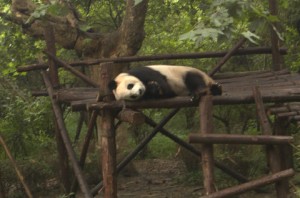Here are my general observations on this past summer:
- Noodles. I love noodles. I am looking for noodle recipes and probably making a trip soon to Chinatown for supplies. Chengdu is known for food, and even a vegetarian can eat well (assuming, of course, that she likes noodles and spice!)
- It’s amazing how productive I can be without regular Internet access, a smartphone, or English-language television – or the responsibility of maintaining a household. I read 12 books! Okay, so one was a novella.
- The people of Chengdu are really nice and really friendly. They were so welcoming of visitors! It was wonderful.
- No one speaks English in Chengdu, and Mandarin is a killer language. The Lonely Planet Mandarin Phrase Book was incredible. Between pointing at phrases, using sign language, and smiling a lot, I could get just about anything done.
- It is difficult to get around in China. Foreigners need passports to get inter-city plane, train, or bus tickets. Schedules and maps are hard to come by in any language. Construction is everywhere, the roads can’t handle the traffic, and it seems like everyone learned to drive in the last year. Cars are not well maintained and sometimes catch fire. I saw accidents everywhere; my second full day in Chengdu, I was in a taxi and the driver decided to evade traffic by going onto the sidewalk, where he sideswiped a tree. At the end of July, I was hit by a scooter, although the driver was going slow so I wasn’t hurt beyond a skinned knee. Chicago seems so empty in contrast; I was on the Edens Expressway yesterday morning during rush hour, and it felt like there was no traffic at all.
- And the noise! Oh, the noise! I’m the oldest of five children, so I grew up in cacophony. But I couldn’t take the noise in Chengdu, needed earplugs to sleep, and often went to Starbucks to be in something approaching quiet surroundings.
- GoChengdoo is a site for expats in Chengdu, and it also has good tourist info.
- The Wall Street Journal has great English-language coverage of China; it can be accessed there, and it had a lot of stories that I would not have known about otherwise – given that I don’t speak Mandarin and that it is rude for foreigners to talk about politics and non-Olympic current events. I had the impression that it’s considered rude for Chinese people to talk about these things with each other, too.
- China has massive demographic challenges, and some of the concerns made their way into the English-language press – so you know people are worried! For example, the social order is that children will take care of elderly parents, but the one-child policy places a huge burden on the children. Furthermore, many elderly people have seen their one child die, and who will take of them? The massive urban migration is leaving many elderly people in the countryside with no one to take care of them; in many cases, the grandparents are caring for grandchildren in the country while the parents are earning a living in the city, and there are concerns that this will create a generation of wayward youth.
- Because of the need to keep people working, commerce in China isn’t terribly efficient. The construction techniques were hardly state of the art, and many stores had one person to ring up a purchase and a second to wrap the goods. Even at Walmart, there was at least one person in each grocery department whose job it was to weigh bulk times – that was not done at check out. For now, the inefficiency helps the economy, but it could keep growth from going to the next level.
- If you shop at Chinese places, you pay Chinese prices. My standard lunch was a noodle or rice dish from a local shop and a Coke Zero, and that was 10 RMB – less than $2.00 US. Go to Starbucks, though, and pay 25 RMB for an iced tea – over $4.00 US. (I’d put the Walmart in the category of Chinese places – it was not an expat hangout, nor in an expat neighborhood. There, I could buy enough prepared food for three meals for 10 RMB.) To put these prices in perspective, consider that the per-capita income of an urban Chinese is about 24,000 RMB – or about $4000 US per year. On the other hand, I sometimes ate at the campus cafeteria, where rice was free (and a full dinner was 5 RMB). China is a Communist country, and universal basic sustenance is one of the key tenets of Communism.
- The pandas are the cutest! But so lazy! See them before they go extinct, because they seem to have no interest in survival if it means having to get up and move around – the picture shows typical panda behavior.
- Yes, I’d go back. In a heartbeat.



